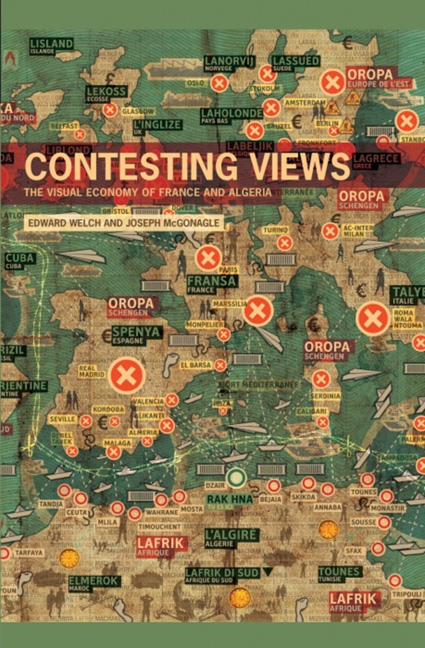Book contents
- Frontmatter
- Contents
- List of Illustrations
- Acknowledgements
- Introduction: Visualising the Franco-Algerian Relationship
- I Algerian Pasts in the French Public Sphere
- 1 Wish We Were There: Nostalgic (Re)visions of France's Algerian Past
- 2 Visions of History: Looking Back at the Algerian War
- 3 Out of the Shadows: The Visual Career of 17 October 1961
- II Mapping Franco-Algerian Borders in Contemporary Visual Culture
- Conclusion
- Notes
- Bibliography
- Index
3 - Out of the Shadows: The Visual Career of 17 October 1961
from I - Algerian Pasts in the French Public Sphere
- Frontmatter
- Contents
- List of Illustrations
- Acknowledgements
- Introduction: Visualising the Franco-Algerian Relationship
- I Algerian Pasts in the French Public Sphere
- 1 Wish We Were There: Nostalgic (Re)visions of France's Algerian Past
- 2 Visions of History: Looking Back at the Algerian War
- 3 Out of the Shadows: The Visual Career of 17 October 1961
- II Mapping Franco-Algerian Borders in Contemporary Visual Culture
- Conclusion
- Notes
- Bibliography
- Index
Summary
Re-viewing State Violence
Of all the events of the Algerian War, those which took place in Paris on and around 17 October 1961 are now among the most notorious and controversial. A brief account of the episode runs as follows: on the evening of 17 October, with the war still several months from its conclusion, several tens of thousands of Algerian immigrants were mobilised by the FLN, converging on central Paris from different points in the suburbs. Their aim was to stage a peaceful protest march against a curfew on their movements imposed earlier that month by the Chief of the Paris Police, Maurice Papon. Crowds began to assemble at different locations on the Right and Left Banks of the capital after the curfew hour of 8.30 p.m. The police response to the protest was brutal: an unknown number of Algerians were killed and injured, initially on the streets of the capital and its suburbs, and later in detention centres such as the Palais des Sports at the Porte de Versailles, to which the protestors were bussed before being deported to Algeria. Some estimates, most notably those by the historian Jean-Luc Einaudi (1991), place the number of dead as high as 200. If uncertainty remains over the precise figure, it is because many bodies were never recovered or identified, pitched into the Seine or buried in mass graves. According to Jim House and Neil MacMaster, authors of the most authoritative account of 17 October, its prehistory and aftermath, the events represent ‘the bloodiest act of state repression of street protest in Western Europe in modern history’ (House and MacMaster 2006: 1).
Since the end of the Algerian War, the events of 17 October have undertaken a remarkable historical trajectory. They are perhaps one of the most obvious examples of what Anne Donadey (1996) terms France's ‘Algeria Syndrome’, in reference to Henry Rousso's diagnosis of a ‘Vichy Syndrome’ in post-war France; that is to say, a refusal to engage with and account for aspects of the Algerian War which echoes similar denial and obfuscation about the Occupation and Vichy France.
- Type
- Chapter
- Information
- Contesting ViewsThe Visual Economy of France and Algeria, pp. 65 - 90Publisher: Liverpool University PressPrint publication year: 2013



